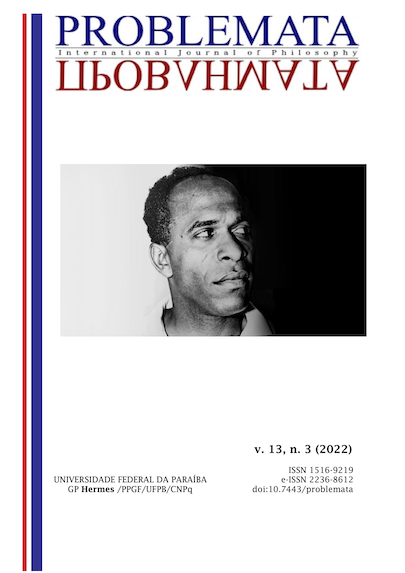RAWLS, PRIMARY GOODS AND CAPABILITIES
DOI:
https://doi.org/10.7443/problemata.v13i3.64060Keywords:
Primary (social) goods, Original Position, Capabilities, Amartya SenAbstract
The choice of principles of justice as fairness, in John Rawls' thinking, takes place through the original position. In this procedure the parties would be under a veil of ignorance, and therefore would have no information about their psychological and moral conceptions, as well as information about their social classes, religion, etc. Despite not having this information, in the original position, the parties will choose the primary social goods. These primary goods, according to Rawls, are things that a rational person is conjectured to always want more than less. The Indian economist Amartya Sen, however, presents the main challenge to Rawlsian primary goods. The point made by the author is that primary goods are, at best, means to the ends valued in human life. Thus, primary goods are only means to other things, in particular to liberty. The Indian economist argues that the products of primary goods are not intended to be what people consider important for their lives. In this paper we aim to argue that Sen's critique of Rawlsian primary goods does not follow, and that this is particularly clear in Rawls' later works.
Downloads
References
ALI, N. Economic inequality and proportionality: how rich should the 1% be? 2018. 299f. Tese (Doutorado em Filosofia) – Centro de Filosofia e Ciências Humanas, Universidade Federal de Santa Catarina, Florianópolis, 2018.
ARNESON, R. Primary Goods Reconsidered. Noûs, v. 24, n. 3, p. 429-454, jun., 1990,.
BUCHANAN, A. Revisability and rational choice. In: RICHARDSON. H. Development and Main Outlines of Rawls's Theory of Justice. New York and London: Garland Publishing, Inc., 1999b.
DANIELS, N. Democratic Equality: Rawls’s Complex Egalitarianism. In: FREEMAN, S. Rawls. Abingdon and New York: Routledge, 2007.
GUTMANN, Amy. Liberal Equality. Cambridge: Cambridge University Press, 1980.
MAFFETTONE, S. Political Liberalism: Reasonableness and democratic practice. Philosophy & Social Criticism. v. 30, n. 5-6, p. 541-577, 2004. doi:10.1177/0191453704045754.
O’NEILL, M.; WILLIAMSON, T. Philosophical foundations for ‘good capitalism’? Labour’s business agenda, John Rawls, and property-owning democracy. Renewal: A Journal of Social Democracy, v. 20, n. 1, p. 20-32, 2012.
RAWLS, J. A Theory of Justice. Original edition. Cambridge and London: Belknap press of Harvard University Press, 1971.
RAWLS, J. A Theory of Justice. Revised edition. Cambridge: Belknap press of Harvard University Press, 1999a [1971].
RAWLS, J. Justice as Fairness. A Restatement. Erin Kelly (ed.). Cambridge and London: Belknap press of Harvard University Press, 2001.
RAWLS, J. Kantian Constructivism in Moral Theory. The Journal of Philosophy, v. 77, n. 9, p. 515-572, 1980.
RAWLS, J. Political Liberalism. New York: Columbia University Press, 1996 [1993].
RAWLS, J. Social Unity and Primary Goods. In: RAWLS, J. Collected Papers. Samuel Freeman (org.). Cambridge and London: Havard University Press, 1999b [1982].
RAWLS, J. The law of peoples. Cambridge and London: Havard University Press, 1999c.
RAWLS, J. The law of peoples. Critical Inquiry. v. 20, n. 1, p. 36-68, Autumn, 1993.
RAWLS, J. The Priority of Right and Ideas of the Good. In: RAWLS, J. Collected Papers. Samuel Freeman (org.). Cambridge and London: Havard University Press, 1999d [1988].
SEN, A. A ideia de justiça. Tradução de Denise Bottmann e Ricardo Doninelli Mendes. São Paulo: Companhia das Letras, 2011.
SEN, A. Equality of What? The tanner lecture on human values. Stanford: Stanford University, 1979.
SEN, A. Justice: means versus freedoms. In: Development and Main Outlines of Rawls's Theory of Justice. New York and London: Garland Publishing, Inc., 1999.
VITA, Á. O liberalismo igualitário: sociedade democrática e justiça internacional. São Paulo: WMF Martins Fontes, 2008.
VITA, Á. Teoria política normativa e justiça rawlsiana. In: Lua Nova, São Paulo, 102, p. 93-135, 2017.
WERLE, D. L.. A estrutura básica como objeto da justiça: liberdades básicas e as bases sociais do autorrespeito. Cadernos de Filosofia Alemã: Crítica e Modernidade, v. 19, p. 63-83, 2014a.
WERLE, D. L. Justica, liberdades básicas e as bases sociais do autorespeito. Ethic@ (UFSC), v. 13, p. 74-90, 2014b.
Downloads
Published
Issue
Section
License
Copyright (c) 2022 Julio Tomé

This work is licensed under a Creative Commons Attribution 4.0 International License.
Authors who publish with this journal agree to the following terms:
- Authors retain copyright and grant the journal right of first publication with the work simultaneously licensed under a Creative Commons Attribution License that allows others to share the work with an acknowledgement of the work's authorship and initial publication in this journal.
- Authors are able to enter into separate, additional contractual arrangements for the non-exclusive distribution of the journal's published version of the work (e.g., post it to an institutional repository or publish it in a book), with an acknowledgement of its initial publication in this journal.
-
- Authors are permitted and encouraged to post their work online (e.g., in institutional repositories or on their website) prior to and during the submission process, as it can lead to productive exchanges, as well as earlier and greater citation of published work (See The Effect of Open Access).





